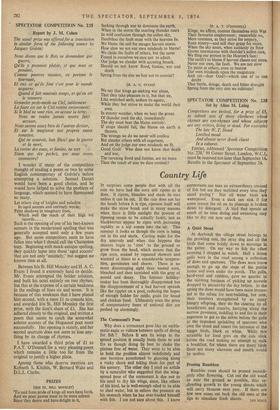Country Life
IT surprises some people that with all the rain we have had the corn still ripens as it does. It ripens, bleaches and sheds its ears unless it can be cut. If the rain does not lay the heads before it is ripe, ripeness itself will make the straw break and in many seasons when there is little sunlight the process of ripening seems to be actually faster, just as blackberries appear to ripen with increasing rapidity as a nip comes into the air. This summer it looks as though the corn is being cut in fits and starts. Carting waits for the dry intervals and when this happens the sheaves begin to 'root' to the ground or grow from the head, which means that the ripe corn, soaked by repeated showers and warmed at times to a considerable tempera- titre, germinates and shoots. There is no more discouraging sight than wasted corn, bleached and then tarnished with the grey of mould and decay. The summer holiday- maker has been thoroughly disappointed but the disappointment of a bad harvest spreads like the ripples on a pool, reducing the hopes of enough fodder for cattle, grain for bread and chicken food. Ultimately even the price of compensatory items of national diet are pushed up alarmingly.


































 Previous page
Previous page